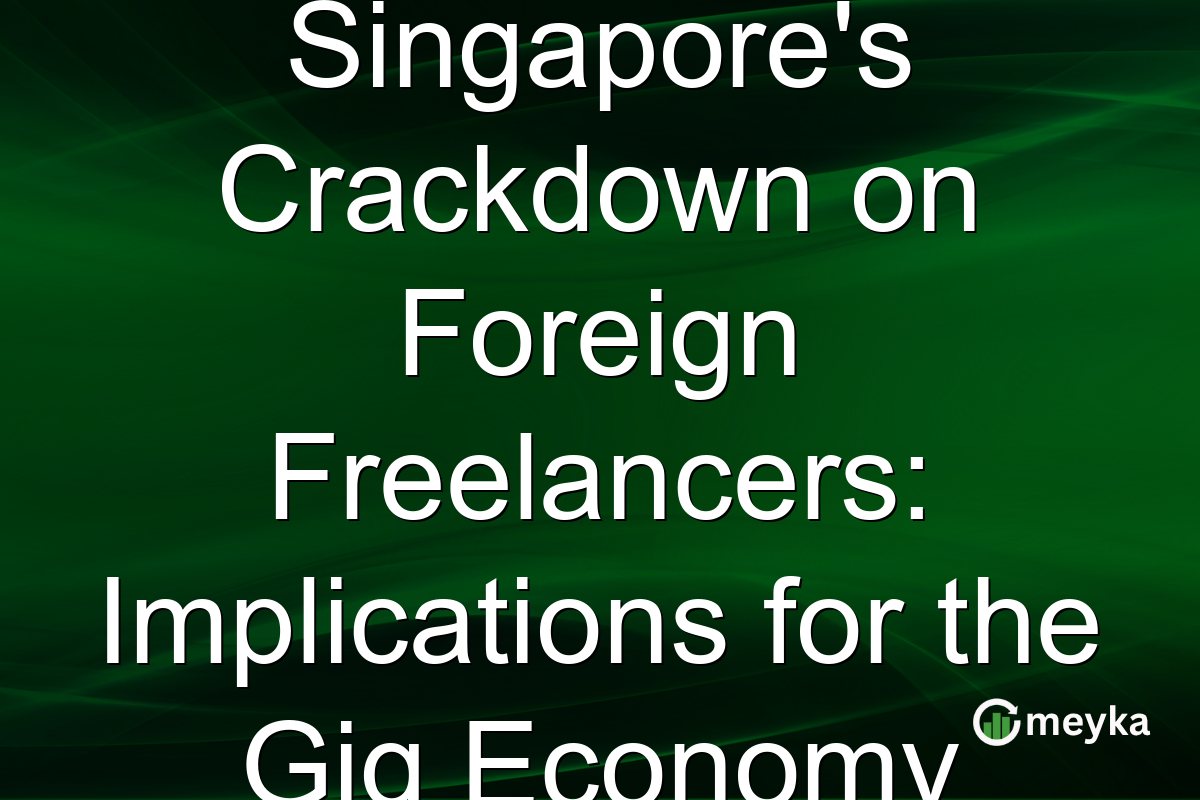Singapore’s Crackdown on Foreign Freelancers: Implications for the Gig Economy
Singapore has made a bold move by prohibiting companies from hiring foreign freelancers for creative services. This decision, led by the Ministry of Manpower (MOM) and the Visual, Audio, Creative Content Professionals Association (Vicpa), aims to enforce the Employment of Foreign Manpower Act. Let’s delve into the reasons behind this crackdown and its potential effects on Singapore’s gig economy.
Understanding the New Regulations
The new regulations target the creative sector, a key part of Singapore’s economy. The joint advisory issued by MOM and Vicpa clearly outlines that any company engaging foreign freelancers in these services is now in violation of the Employment of Foreign Manpower Act. This advisory is seen as a move to protect local workers and ensure compliance with existing laws. By focusing on the employment framework, Singapore aims to address concerns over the employment conditions and rights of foreign freelancers. Further, the regulations highlight the importance of fostering local talent and providing them with ample opportunities. The government believes that restricting foreign engagement will help local freelancers thrive in a competitive market.
Impact on the Gig Economy
This crackdown is set to have significant implications for the gig economy in Singapore. Many companies, particularly in media and advertising, often rely on the expertise of international talent. By restricting access to foreign freelancers, these businesses may face increased challenges in sourcing specialized skills. Moreover, the gig economy has been a vital part of Singapore’s innovation ecosystem, providing flexibility and new opportunities. Reports suggest that the impact might be mixed, as some local freelancers could benefit from reduced competition, while others might find the skill gap a substantial barrier to advancement. Balancing these interests is crucial for maintaining economic dynamism.
Reactions from the Business Community
The business community’s reaction has been varied. Some companies express concern over the availability of talent, questioning how they will meet demand amid these new restrictions. For sectors that depend heavily on specific creative skills, finding locally trained professionals may become a significant hurdle. Critics argue that the sudden policy shift could disrupt project timelines and inflate costs due to a lack of available local talent with niche expertise. However, proponents of the regulations believe it’s a step toward sustainable growth and employment for local workers. Balancing economic growth with employment laws has always been challenging, and this scenario illustrates those complexities.
Global Implications and Future Prospects
On the international front, Singapore’s move might influence other countries considering similar restrictions. The decision reflects a broader global narrative about protecting local employment in the face of globalization. Countries may watch closely to see if the policy achieves its intended goals. For the future, the Singaporean government may need to explore strategies to enhance the skill sets of local workers further. Upskilling initiatives and partnerships with educational institutions could be vital in ensuring that the talent pool matches industry needs. According to industry analyses, investing in local talent development will be key in navigating this new landscape.
Final Thoughts
Singapore’s crackdown on engaging foreign freelancers in creative services is a significant policy shift. It underscores the country’s commitment to local workforce development, albeit with some challenges for businesses reliant on international talent. The ability of the gig economy to adapt to these changes will depend largely on how effectively local skills are nurtured and how flexibly businesses can adjust. For those in the financial and investment sectors, platforms like Meyka offer invaluable insights, providing real-time analysis to navigate such regulatory complexities in Singapore’s,
FAQs
Singapore’s ban aims to enforce compliance with the Employment of Foreign Manpower Act and protect local employment opportunities in the creative sector.
Many businesses may face challenges sourcing specialized skills and could see increased costs and project delays due to reduced access to international talent.
Other countries might consider similar restrictions, observing Singapore’s outcomes to see if the policy effectively supports local employment without stunting economic growth.
Disclaimer:
This is for information only, not financial advice. Always do your research.






